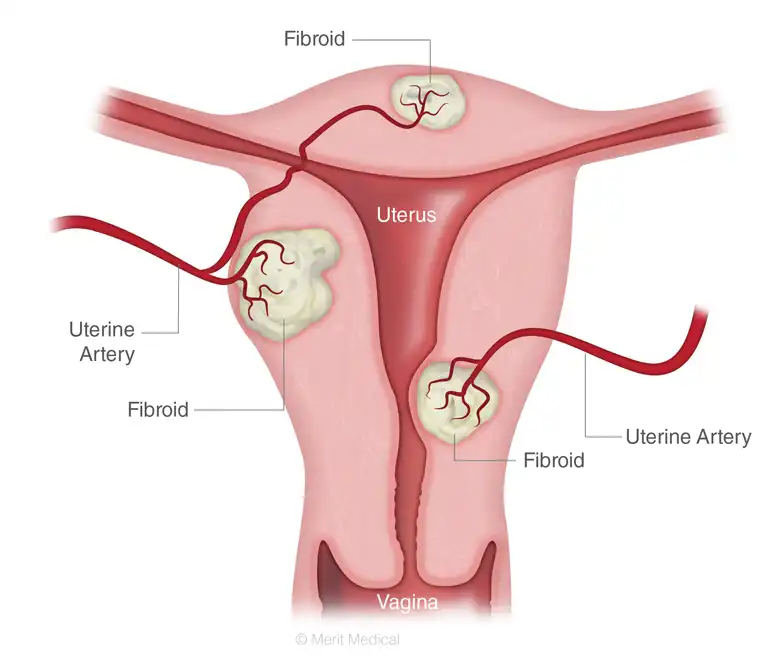You may experience different symptoms depending on the size of the fibroid, what type of fibroid you have, and where it’s located. If you experience symptoms like heavy bleeding, pain, or urinary incontinence, talk with a gynecologist. Call the uterine fibroid embolization doctors at Fresno Fibroid Center at (559) 436-4737.

Learn more about subserosal fibroids, intramural fibroids, submucosal fibroids, and pedunculated fibroids below.
Types of Fibroids
There are four primary types of fibroids:

Subserosal Fibroids
Subserosal fibroids typically develop on the outer uterine wall. This type of fibroid tumor can continue to grow outward increasing in size. The growth of a subserosal fibroid tumor will put additional pressure on the surrounding organs. Therefore, symptoms of subserosal fibroid tumors usually do not include abnormal or excessive menstrual bleeding or interfere with a women’s typical menstrual flow. These fibroid tumors instead cause pelvic pain and pressure. Depending on the severity and the location of the fibroids other complications can accompany this pain and pressure.
Intramural Fibroids
Intramural fibroid tumors typically develop within the uterine wall and expand from there. These uterine fibroids are the most common. When an intramural fibroid tumor expands, it tends to make the uterus feel larger than normal, which can sometimes be mistaken for pregnancy or weight gain. This type of fibroid tumor can also cause “bulk symptoms”. As these fibroids grow, they can cause excessive menstrual bleeding, which can cause prolonged menstrual cycles and clot passing and pelvic pain. This happens from the additional pressure placed on surrounding organs by the growth of the fibroids which consequently can cause frequent urination and pressure.
Submucosal Fibroids
The least common of the various types of fibroid tumors are submucosal fibroids. These fibroids develop just under the lining of the uterine cavity. Large submucosal fibroid tumors may increase the size of the uterus cavity, and can block the fallopian tubes which can cause complications with fertility. Some fibroid tumors don’t produce any symptoms at all, while others can be severely symptomatic.
Associated symptoms with submucosal fibroids include very heavy, excessive menstrual bleeding and prolonged menstruation. These symptoms can also cause the passing of clots, and frequent soiling which can take its toll on your everyday lifestyle. Untreated, prolonged or excessive bleeding can cause more complicated problems such as anemia and/or fatigue, which could potentially lead to a future need for blood transfusions.
Pedunculated Fibroids
Pedunculated uterine fibroids occur when a fibroid tumor grows on a stalk. A fibroid growing into the cavity of the uterus is said to be a pedunculated submucosal fibroid. A fibroid growing from the outside of the uterus into the pelvis is considered a pedunculated subserosal fibroid. Symptoms associated with pedunculated fibroid tumors include pain and pressure as the fibroids can sometimes twist on the stalk.
A woman may have one or all of these types of fibroids. It is common for a woman to have multiple fibroid tumors and it may be difficult to understand which fibroid is causing your symptoms. Because fibroid tumors can be multiple and can be spread out in the uterus, there are usually more fibroids present than can be detected because of their small size. Even a woman who has only one visible fibroid needs to consider that there may be multiple uterine fibroids present when discussing therapy. Uterine fibroids may also be referred to as myoma, leiomyoma, leiomyomata, and fibromyoma.
© 2003-2015 Merit Medical Systems, Inc. All Rights Reserved.
